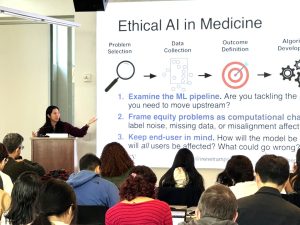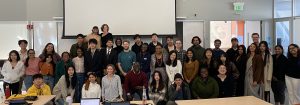Berkeley, CA, February 19, 2020 — The John D. and Catherine T. MacArthur Foundation today unveiled that Dan Fletcher’s project for Removing the Greatest Obstacle to the Elimination of River Blindness and Ashok Gadgil’s project for Ending Arsenic Poisoning for Marginalized People via Safe Drinking Water are among the highest-scoring proposals, designated as the Top 100, in its 100&Change competition for a single $100 million grant to help solve one of the world’s most critical social challenges.
The river blindness project is led by Daniel A. Fletcher, UC Berkeley’s Purnendu Chatterjee Chair in Biological Systems and Chief Technologist of the Blum Center for Developing Economies, with partners The Task Force for Global Health and The END Fund. Its goal is to eliminate onchocerciasis, also known as river blindness, using the LoaScope, a mobile phone-based diagnostic technology developed by the Fletcher Lab. Two hundred million people in 10 Central African countries are at risk of blindness from the parasitic infection. Half have gone untreated by the “wonder drug” ivermectin—recognized by the 2015 Nobel Prize—because of another parasite that can cause serious or fatal side effects following treatment. Fletcher’s proposal aims to expand access to the LoaScope device; resolve uncertainty about the extent of disease overlap through mapping; and initiate data-driven disease elimination programs across all populations currently excluded from treatment. This work will clear a path towards the World Health Organization’s goal of river blindness elimination.
The arsenic removal project is led by Ashok Gadgil, the Andrew and Virginia Rudd Family Foundation Chair Professor of Safe Water and Sanitation and a Blum Center Affiliated Faculty Member. Its goal is to scale up the Gadgil Lab‘s ElectroChemical Arsenic Remediation (“ECAR”) technology for drinking water. Currently, 200 million historically marginalized people worldwide have no choice but to drink water containing toxic levels of arsenic. Consequences include painful disabilities, internal cancers, and death. ECAR is inexpensive and designed to work even under harsh conditions. It allows water to be purified locally in marginalized communities and sold at affordable prices, while creating local employment and generating sufficient revenue for sustainable operation and further expansion. With additional funding, Gadgil’s ECAR team aims to build 1,004 plants in India, USA, and Nigeria to provide safe drinking water to 4-5 million people and end what the World Health Organization has called “the largest mass poisoning in recorded history.”
The Top 100 represent the top 21 percent of competition submissions. The proposals were rigorously vetted, undergoing MacArthur’s initial administrative review, a Peer-to-Peer review, an evaluation by an external panel of judges, and a technical review by specialists whose expertise was matched to the project.
Each proposal was evaluated using four criteria: impactful, evidence-based, feasible, and durable. MacArthur’s Board of Directors will select up to 10 finalists from these high-scoring proposalsthis spring.
“MacArthur seeks to generate increased recognition, exposure, and support for the high-impact ideas designated as the Top 100,” said Cecilia Conrad, CEO of Lever for Change and MacArthur Managing Director, 100&Change. “Based on our experience in the first round of 100&Change, we know the competition will produce multiple compelling and fundable ideas. We are committed to matching philanthropists with powerful solutions and problem solvers to accelerate social change.”
Since the inaugural competition, other funders and philanthropists have committed an additional $419 million to date to support bold solutions by 100&Change applicants. Building on the success of 100&Change, MacArthur created Lever for Change to unlock significant philanthropic capital by helping donors find and fund vetted, high-impact opportunities through the design and management of customized competitions. In addition to 100&Change, Lever for Change is managing the Chicago Prize, the Economic Opportunity Challenge, and the Larsen Lam ICONIQ Impact Award.
Bold Solutions Network Launches
The Bold Solutions Network launched today, featuring UC Berkeley-Task Force for Global Health-END Fund as one of the Top 100 from 100&Change. The searchable online online collection of submissions contains a project overview, 90-second video, and two-page factsheet for each proposal. Visitors can sort by subject, location, Sustainable Development Goal, or beneficiary population to view proposals based on area of interest.
The Bold Solutions Network will showcase the highest-rated proposals that emerge from the competitions Lever for Change manages. Proposals in the Bold Solutions Network undergo extensive evaluation and due diligence to ensure each solution promises real and measurable progress to accelerate social change.
The Bold Solutions Network was designed to provide an innovative approach to identifying the most effective, enduring solutions aligned with donors’ philanthropic goals and to help top applicants gain visibility and funding from a wide array of funders. Organizations that are part of the network will have continued access to a variety of technical support and learning opportunities focused on strengthening their proposals and increasing the impact of their work.
More About 100&Change
100&Change is a distinctive competition that is open to organizations and collaborations working in any field, anywhere in the world. Proposals must identify a problem and offer a solution that promises significant and durable change.
The second round of the competition had a promising start: 3,690 competition registrants submitted 755 proposals. Of those, 475 passed an initial administrative review. 100&Change was designed to be fair, open, and transparent. The identity of the judges and the methodology used to assess initial proposals are public. Applicants received comments and feedback from the peers, judges, and technical reviewers. Key issues in the competition are discussed in a blog on MacArthur’s website.
In the inaugural round of 100&Change, Sesame Workshop and International Rescue Committee were awarded $100 million to educate young children displaced by conflict and persecution in the Syrian response region and to challenge the global system of humanitarian aid to focus more on building a foundation for future success for millions of young children. &





